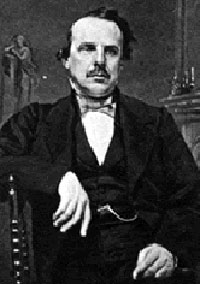 Bartow served two terms in the State Legislature and one term in the State Senate from Savannah prior to the Civil War.
He initially supported the Whig Party, then lost an 1854 bid for Congress on the Know-Nothing ticket.
Bartow served two terms in the State Legislature and one term in the State Senate from Savannah prior to the Civil War.
He initially supported the Whig Party, then lost an 1854 bid for Congress on the Know-Nothing ticket.
Francis Stebbins Bartow (1816-1861)
Francis Stebbins Bartow was born on September 6, 1816, in Savannah, Georgia, to a distinguished Georgia family. He graduated from Yale Law School, and became a planter and slaveowner.
 Bartow served two terms in the State Legislature and one term in the State Senate from Savannah prior to the Civil War.
He initially supported the Whig Party, then lost an 1854 bid for Congress on the Know-Nothing ticket.
Bartow served two terms in the State Legislature and one term in the State Senate from Savannah prior to the Civil War.
He initially supported the Whig Party, then lost an 1854 bid for Congress on the Know-Nothing ticket.
By 1860, he lost faith in both the Whigs and the Know-Nothings, and joined the Democrats. Bartow was a strong supporter of secession, and was a delegate to the Georgia Secession Convention. Bartow was a passionate and persuasive advocate for Georgia's secession from the Union, and as chairman of the military committee, was instrumental in the selection of grey uniforms for Confederate troops. His fervent secessionist stand led to his being elected to the Provisional Confederate Congress, and he served on the Flag and Seal, Engrossment and Military Affairs Committees, as well as serving as chairman of the Military Affairs Committee.
Bartow thought that the Union would allow the South to secede without a war. Nevertheless, Confederate President Jefferson Davis convinced Bartow to support a longer term for volunteer enlistments.
Bartow became a captain in the Oglethorpe Light Infantry, a home-guard unit in which the sons of Savannah's leading families served. When the Confederate Congress voted to forbid people from holding both political and military office, Bartow chose to remain in the military and give up his political position.
The Oglethorpe Light Infantry, which had taken part in the seizure of Fort Pulaski, was transferred to the 8th Georgia Infantry. Bartow and the troops headed to the Shenandoah Valley to take part in the First Battle of Bull Run. Only half of Bartow's troops, however, were able to arrive in time to fight. Barlow himself took the forward position, leading his troops in a charge down Henry Hill. There he was mortally wounded, and was reported to have said as his last words: "They have killed me, boys, but never give up the field." A few minutes later, on July 21, 1861, Bartow died.
Bartow was the first officer of either Army killed on the field during the Battle of Manassas. In November 1861, a bill was successfully introduced into the Georgia House of Representatives to change the name of Cass County to Bartow County in honor of the South's first fallen hero.